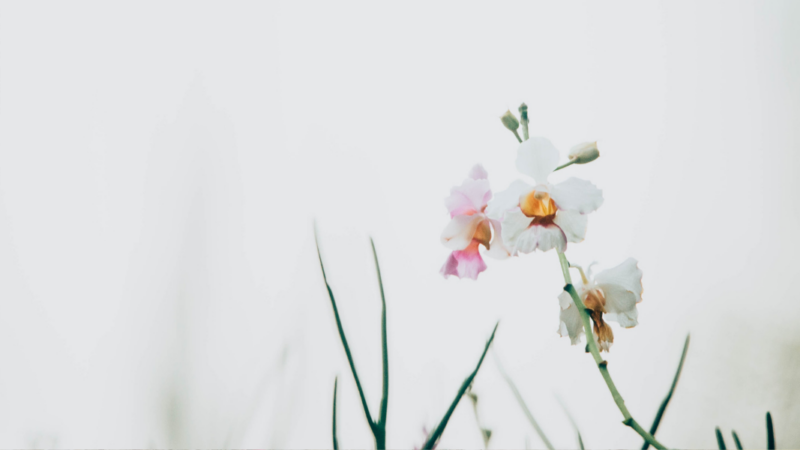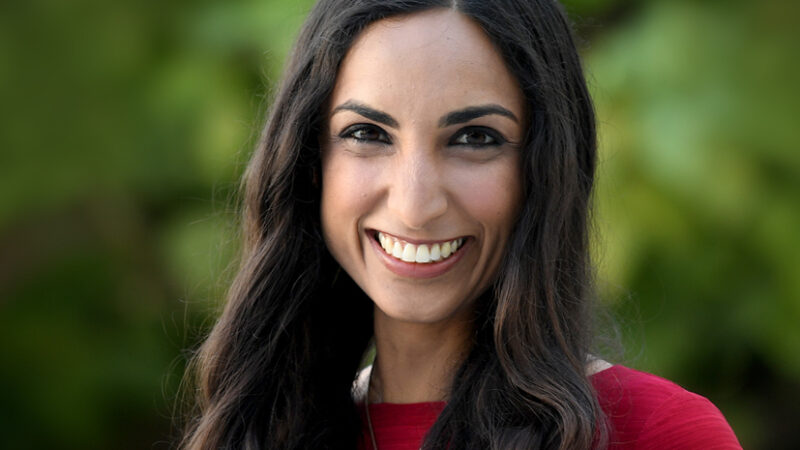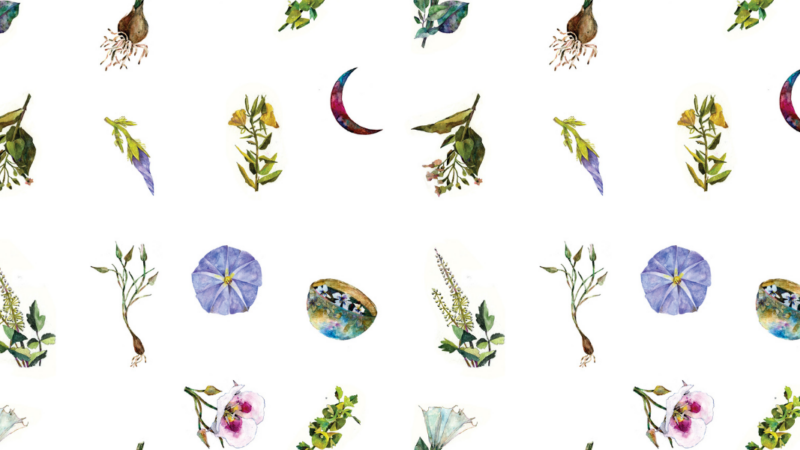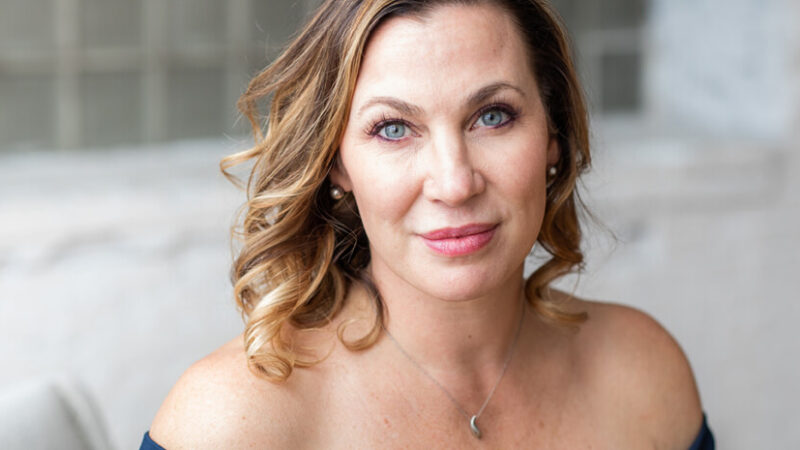-
E117: The Real Work: Letting Go from Within
Michael Singer — October 2, 2025
True spirituality isn’t about mystical experiences or lofty ideals—it’s about honestly facing...
-
Once More: Reflections on Reincarnation and the Gap Between Lives
Tami Simon — September 26, 2025
In this special reflection episode of Insights at the Edge host Tami Simon looks back on her...
-
Honey Tasting Meditation: Build Your Relationship with Sweetness
There is a saying that goes “hurt people hurt people.” I believe this to be true. We have been...
Written by:
Amy Burtaine, Michelle Cassandra Johnson
-
Many Voices, One Journey
The Sounds True Blog
Insights, reflections, and practices from Sounds True teachers, authors, staff, and more. Have a look—to find some inspiration and wisdom for uplifting your day.
Standing Together, and Stepping Up
Written By:
Tami Simon -
The Michael Singer Podcast
Your Highest Intention: Self-Realization
Michael Singer discusses intention—"perhaps the deepest thing we can talk about"—and the path to self-realization.
This Week:
E116: Doing the Best You Can: The Path to Liberation -
Many Voices, One Journey
The Sounds True Blog
Insights, reflections, and practices from Sounds True teachers, authors, staff, and more. Have a look—to find some inspiration and wisdom for uplifting your day.
Take Your Inner Child on Playdates
Written By:
Megan Sherer
600 Podcasts and Counting...
Subscribe to Insights at the Edge to hear all of Tami's interviews (transcripts available, too!), featuring Eckhart Tolle, Caroline Myss, Tara Brach, Jack Kornfield, Adyashanti, and many more.
Most Recent
The Courage to Stand Alone
The Courage to Stand Alone
It can be scary when we are called to confront our aloneness, the seemingly infinite depths of that empty, homeless feeling inside of us. When all our old protections fall away and the abandoned and neglected ones inside come begging for our love and attention. It can feel sometimes as though there’s nowhere to turn, like we want to crawl out of our own skin, urgently get out of the Now and into some other time or place.
It takes bravery to stop, breathe, and—slowly, slowly, slowly—turn back toward the lonely, dark, empty “void” inside (in reality, there is no void). To actually turn to face the sense of abandonment buried deep within our guts, to soften into the sense of separation that has been with us for as long as we can remember. We don’t have to make the feeling go away today, only lean into it, breathe into it, begin to make room for it, maybe even learn to trust its presence.
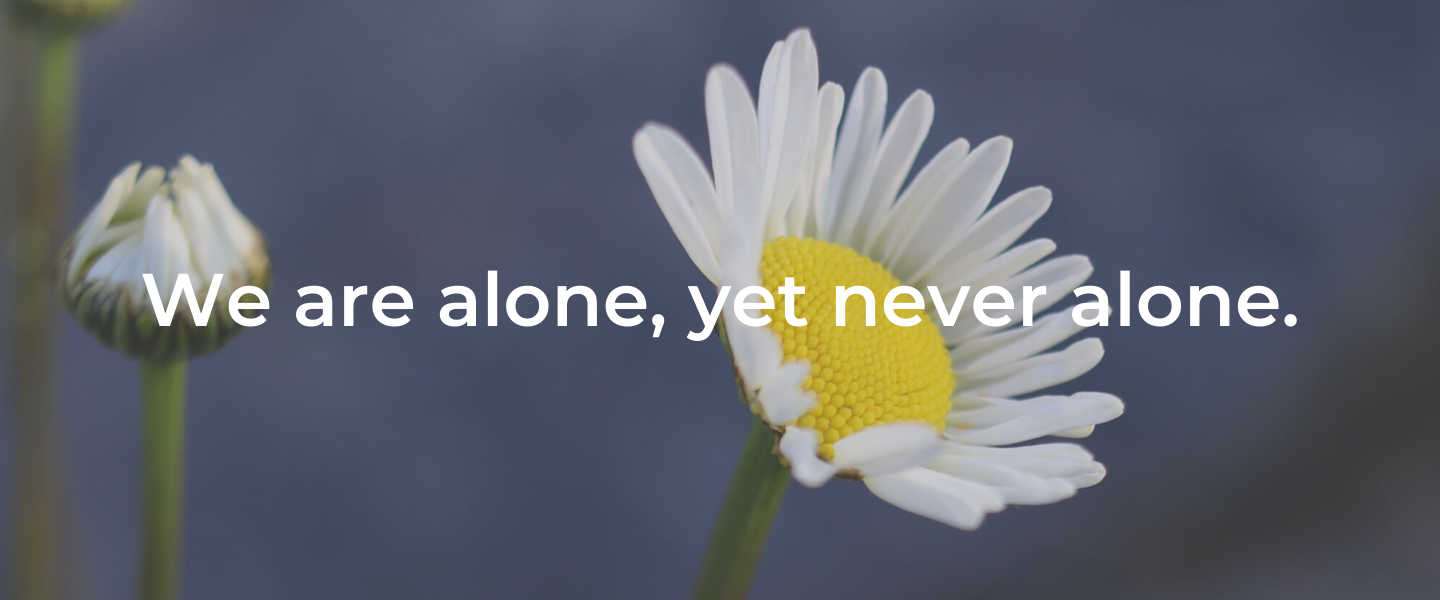
Perhaps loneliness is like a cosmic nostalgia, a preverbal memory of a deep womb-connection, with ourselves, with the planet, with every being who has ever lived. In leaning into our own loneliness, shame, and existential anxiety, we may be able to touch into compassion for the loneliness of every human being, for every heart longing to connect, for every grieving heart, every frightened heart.
We are alone, yet never alone. This is the great paradox of existence. Our loneliness, when not resisted or numbed away, may actually end up connecting us more deeply to life and each other, like it did for me and my sweet father that winter evening.
Let us learn to be alone, then! Alone, without distraction, which is true meditation. Alone, communing with the breath as it rises and falls. Alone with the mind and its incredible dance. Alone with the rain and the morning sun. Alone with the crackle of autumn leaves under our feet, or the crunch of winter snow. Alone with the hopes and joys and anxieties of this human form, living a single day on this remarkable planet. Alone with our precious selves, with this unfathomable sense of connection to all things, with birth and loss and death and their myriad mysteries.
Alone, with all of life.
This is an excerpt from You Were Never Broken: Poems to Save Your Life by Jeff Foster.
 Jeff Foster shares from his own awakened experience a way out of seeking fulfillment in the future and into the acceptance of “all this, here and now.” He studied astrophysics at Cambridge University. Following a period of depression and physical illness, he embarked on an intensive spiritual search that came to an end with the discovery that life itself was what he had always been seeking.
Jeff Foster shares from his own awakened experience a way out of seeking fulfillment in the future and into the acceptance of “all this, here and now.” He studied astrophysics at Cambridge University. Following a period of depression and physical illness, he embarked on an intensive spiritual search that came to an end with the discovery that life itself was what he had always been seeking.
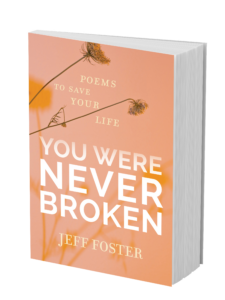
Learn More
Valarie Kaur: Activating Revolutionary Love
Valarie Kaur is a seasoned civil rights activist and celebrated prophetic voice at the forefront of progressive change. She’s the founder of the Revolutionary Love Project and author of the book See No Stranger: A Memoir and Manifesto of Revolutionary Love. With Sounds True, Valarie has created The People’s Inauguration—a 10-day online program to help us reckon with all we have lost and point us toward a vision of the society we can build together, grounded in love. In this episode of Insights at the Edge, Tami Simon and Valarie discuss “revolutionary love” as a guiding ethic for our times. They explore what it is to extend love to all people without limit and how opening our hearts in this way is both an ancient and radical act. Valarie also talks about “the heart and the fist,” and why both are necessary in order to create the systemic, cultural, and environmental transformations our world needs. Finally, Valarie shares what we can learn from our rage and grief, as well as the importance of connecting with our joy and our ancestors as we keep showing up for the labors of love before us.
The Remedy We Are Excited To Try in the New Year: Flow...
What are flower essences?
The goals of flower essence therapy include: ease in accessing higher vibratory states like joy and gratitude; enhanced mind-body-spirit balance, presence, acceptance of emotions and integration of difficult vibratory states; encouraging flow states like creativity; manifesting; supporting balance; expanding awareness of self and the Universe, ancestral connection and healing; and helping us to be of greater service to ourselves, others, and the Earth.
Flower essences work by way of the following:
- synchronicities—helping us connect seemingly unrelated or previously unseen opportunities or happenings
- indirect occurrences—positively affecting different environments and interpersonal dynamics
- insights—supporting mental, emotional, physical, and/or astral awakening; new ideas, solutions, or information may present
- physical changes—bringing up new sensations, shifts in organ/system functioning or in symptoms
- emotional responses—bringing up new feelings or memories; stabilizing or releasing them
- expression—inspiring artistic, verbal, and kinesthetic expression
- dreamtime—bringing about new or recurring dreams, insights, and subconscious resolution
- invoking intention—the more time and space you can offer, the more likely you’ll be able to feel flower essences. For example, taking them with a light meditation, a visualization, while doing yoga or some other kind of bodywork or prayer
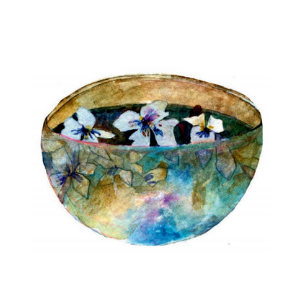
How to Select a Flower Essence
Flower essences can be purchased from a quality producer, or you can make your own. Here, I will discuss how to select and apply ready-made flower essence remedies. You can learn how to wildcraft your own flower essences with me in this video.
When you’re starting out with flower essences, it can be overwhelming—so many producers and so many essences! I like to encourage people to remember that it’s your relationship with the plant that is the most important thing in selection. Your relationship with the remedy is the co-creation with that plant. The more you work with flowers, the more you will be able to feel and trust this part of the process.
The following are some ways to begin exploring flower essences:
- Depending on what issue(s) you’d like to address, begin by taking one to three essences that resonate with you. Many producers offer sets of remedies that have a particular focus. You may want to purchase a set to experiment with, such as the FES’s Range of Light, Delta Gardens’ Protection Set, Alaskan Essences, or the Bach Essences.
- Consider flower essences that invite presence, relaxation, protection, and grounding.
- If you want to study the essences more carefully, consider making flashcards or purchasing the flower cards (Alaskan Essences, FES, and Bach make sets).
- If you’re curious to learn more about how a plant might connect with your ancestry, consider doing some research on how it was used historically.
- Perhaps there’s a flower you’re curious about, or have seen in nature. Ask this plant if it would like to work with you.
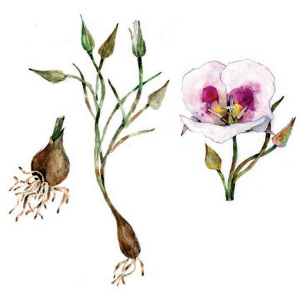
Here are five basic ways to select a flower essence:
- Intuitively: A flower essence might come to you by way of revealing itself in nature, or appearing in a dream.
- By dowsing: Using a tool of resonance, such a pendulum, to test for essences.
- Through muscle testing: A simple way to muscle test is to make a ring with the index finger and thumb of your nondominant hand. If you would like to test for a yes for an essence, say the name of the plant and flick the circle with your dominant hand. If the circle holds, that’s a yes. If it breaks open, that is a no.
- By consulting reference literature: Books, repertories, or flower affirmation cards.
- Through blind testing: By drawing a card or randomly selecting an essence from a set. This method works well with children.
Any of these methods can be integrated into your ritual. Before making remedies for other people, it’s a good idea to spend some time with the flower essences yourself. The flowers will have much to share with you. Also, the more experience you have with the essences yourself, the better you will understand how the essences will work for others.
This is an excerpt from The Bloom Book: A Flower Essence Guide to Cosmic Balance by Heidi Smith.
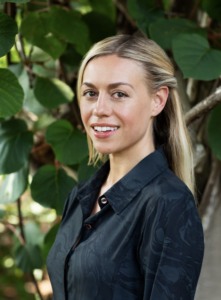 Heidi Smith, MA, RH (AHG), is a psychosomatic therapist, registered herbalist, and flower essence practitioner. Within her private practice, Moon & Bloom, Heidi works collaboratively with her clients to empower greater balance, actualization, and soul-level healing within themselves. She is passionate about engaging both the spiritual and scientific dimensions of the plant kingdom, and sees plant medicine and ritual as radical ways to promote individual, collective, and planetary healing. She lives in Brooklyn, New York, with her partner and two cats. For more, visit moonandbloom.com.
Heidi Smith, MA, RH (AHG), is a psychosomatic therapist, registered herbalist, and flower essence practitioner. Within her private practice, Moon & Bloom, Heidi works collaboratively with her clients to empower greater balance, actualization, and soul-level healing within themselves. She is passionate about engaging both the spiritual and scientific dimensions of the plant kingdom, and sees plant medicine and ritual as radical ways to promote individual, collective, and planetary healing. She lives in Brooklyn, New York, with her partner and two cats. For more, visit moonandbloom.com.
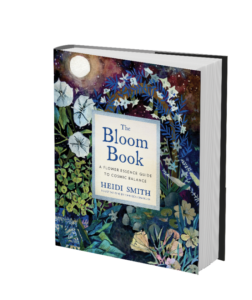
Learn More
Sounds True | Amazon | Barnes & Noble | Bookshop
Customer Favorites
Karen Brody: Daring to Rest
Karen Brody is the founder of the Daring to Rest™ Program for Women, which promotes women’s empowerment and increased health through yoga nidra meditation. With Sounds True, Karen has published Daring to Rest: Reclaim Your Power with Yoga Nidra Rest Meditation. In this episode of Insights at the Edge, Karen and Tami Simon have a serious discussion about the epidemic of burnout and exhaustion in modern culture. This is especially true for women, who are often held to the societal expectation that they serve the needs of those around them before they ever consider taking even the most necessary rest. Karen offers yoga nidra as a one part of the solution to this wave of fatigue, describing how her own practice and the cultivation of turiya—”the sleep of the yogis”—helped her move past a period of intense, chronic sleeplessness. Finally, Karen and Tami speak on the liberation in abandoning perfectionism and how yoga nidra can be folded into the course of our daily lives. (64 minutes)
Rick Doblin: The Psychedelic Renaissance
Rick Doblin, PhD, is a Harvard-trained researcher and the founder of MAPS—the Multidisciplinary Association for Psychedelic Studies. Rick and MAPS work to develop a legal framework for the application of psychedelic drugs both as medication and for personal psychological growth. In this episode of Insights at the Edge, Tami Simon speaks with Rick about the current clinical research surrounding the use of MDMA to treat post-traumatic stress disorder, as well as many other possibilities for other psychedelic-assisted therapies. They talk about the current “psychedelic renaissance” in therapeutic treatment, reflecting on some of the risks of such drug-assisted regimens and the need for careful integration of psychedelic experiences. With this in mind, Tami and Rick discuss his relationship with the Zendo Project, a department of MAPS devoted to helping individuals who are having emotionally challenging psychedelic experiences at festivals and events. Finally, Rick explains his own lifelong relationship with psychedelic drugs, including his hopes for future treatments and a national “coming out party” of prominent individuals who can attest to the difference psychedelics have made in their lives. (73 minutes)
When Grief Lands with Love
Join Sounds True’s founder, Tami Simon, in this compassionate podcast with Dr. Sherry Walling about her new book, Touching Two Worlds, as they discuss navigating the duality that exists on the opposite spectrums of our lives, the healing practice of writing about our experiences of grief, overcoming the stigma and silence around suicide, the just-world hypothesis and how traumatic events change our view, accepting limitations in life while taking responsibility for finding our own sense of meaning, accessing a sense of calm and grace to release the unresolved shock of grief, finding closure versus finding the place “where grief lands with love,” and more.

